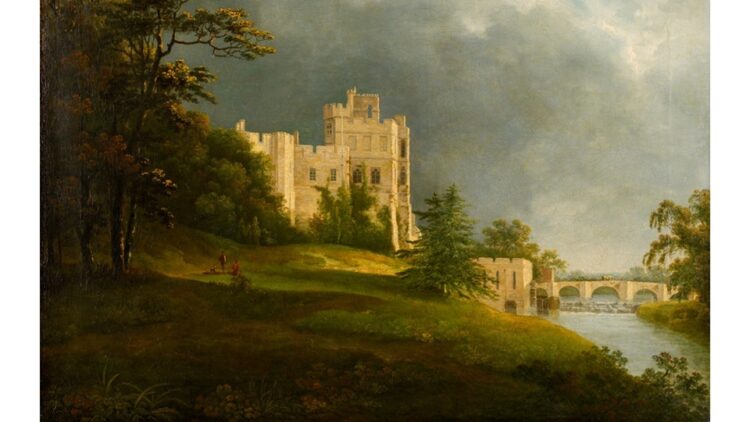The Reliquary
One early morning long ago,
I stopped to watch the Avon flow.
Long-steeped and weedy, olive green,
Its waters slipped along below,
Slid over rocks, and in between—
Gelatinously smooth and slow,
High-hung by vine and leafy screen—
A fragrant, forested ravine.
The sun of that Midsummer day
Had yet to burn the mist away
That hovered on the glassy stream,
In one great swirling golden ray.
I watched the motes suspended gleam,
A shaft of Brownian display.
Bewitched, I watched that glowing beam
And tried to hold it like a dream.
Old willows, spreading mightily
Their overarching filigree
Of purest emerald and jade,
Held twilight in captivity.
The night air loitered in the shade,
Its clammy hands reached out for me.
Though strong, its chill began to fade,
Pierced by that single golden blade.
Time is a grim iconoclast.
Relentlessly, his dull years blast
Down column, pediment, and frieze,
The gilded temple of the past.
Before this vision fades or flees,
Perhaps these words will make it last,
So I may visit, when I please,
The river’s quiet harmonies,
With sunlight in the willow trees.
Patricia Rogers Crozier has been published in The Washington Post. She holds a B.S. in Physics from Mississippi College. She resides in Gulf Breeze, Florida and works at Publix. She is the winner of the 2024 SCP International Poetry Competition.
















A really beautiful poem, with lush language and carefully controlled syntax (the latter necessary when all the lines end masculine).
At first I thought that this should have been divided into three eight-line stanzas, but then I realized that there were twenty-five lines, and I guessed that the poet had the wisdom NOT to excise one line (they are all lovely) just to fit a pattern.
The title is mysterious and suggestive. We normally think of a reliquary as a box or some other kind of container for precious things, such as a saint’s relics. But here I sense that the poet is thinking of all the overhang of nature (“high-hung,” “forested,” “suspended,” “overarching”) as a cover that conceals the speaker.
A poem full of vivid imagery. The ‘filigree ‘ / ‘jade’ lines were particularly lovely.
Thanks for the read, Patricia.
I love the way this poem captures time’s fleeting nature, showing how beauty fades as memory strives to preserve it. I love how the flow of the river (the Avon is so apt) is symbolic of the passing years, while the act of writing stands against decay. This superb poem, a reliquary perhaps, holding the memory of the Avon and its “quiet harmonies”, transforms a transient moment into something timeless and enduring… just as Shakespeare did with his sonnets. Patricia, thank you for this glorious poem that inspires and delights me.
Thank you for this poem. It came at a time when I needed a bit of tranquility and beauty.
Your power of description is exceptional. “Gelatinously smooth and slow” water; the “one great swirling golden ray” of mist; willows holding “twilight in captivity”; and Time as “a grim iconoclast”, all paint such original and brilliant images!
“Perhaps these words will make it last,
So I may visit, when I please,”
That is a nice idea. Making in words a work of art that can then be explored, almost like a temple or other large work of art could be. Or something like that…
A lovely work. The aabababb rhyme scheme is especially intriguing and impressive. Love poems which teach me something and I’d not heard of Brownian motion before. Now I can picture all the motes behaving accordingly.
M. D. Skeen has spelled out the stanza rhyme scheme, though it is meant to be unobtrusive, I believe, with no line breaks to divide the four stanzas. The final stanza adds one more rhyming line in conclusion (for a total of 33 lines). That’s a musical strategy, repeating the rhyme sound as popular songs may fade out while repeating a sung line. In this poem. the final line is not a fade out, but a descriptive reprise. The four final lines make it clear that the poem is the reliquary, or sacred container, not only for the beautiful scene, but for the very moment of a morning during which it is contemplated. Time words are less prominent than place words, but essential to the overall effect of saving one particular space-time to savor again. Splendid reliquary, Patricia.
So soft and beautiful with the final line resonating forever.
A beautiful poem, Patricia. Thank you.
I love the rhythm and rhyme scheme in this; it reads like an old song rediscovered. It is, in a way, for how many people have had this same thought? You put it into beautiful words. Thank you for sharing this!